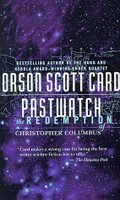 After finishing this book, I almost picked it up and began reading again. But I stopped myself. There are other books to read. And this one will come around again, I'm sure. Card's writing is intriguing, involving, enjoyable. A story in our future where they create technology that allows them to see the past as video. It gets fine tuned enough so they can hear dialog and follow individuals (this amazing technology lets one see practically anything anywhere anytime, a sort of 'big brother' as it were). One woman starts watching the stories of her ancestors, many of whom were slaves - absorbing and understanding their pain. She begins to ask herself -- is there some way this can be stopped? And in one instance, they discover people in the past can see them in the present/future. And those in the past call for help from these 'gods' of the future.
After finishing this book, I almost picked it up and began reading again. But I stopped myself. There are other books to read. And this one will come around again, I'm sure. Card's writing is intriguing, involving, enjoyable. A story in our future where they create technology that allows them to see the past as video. It gets fine tuned enough so they can hear dialog and follow individuals (this amazing technology lets one see practically anything anywhere anytime, a sort of 'big brother' as it were). One woman starts watching the stories of her ancestors, many of whom were slaves - absorbing and understanding their pain. She begins to ask herself -- is there some way this can be stopped? And in one instance, they discover people in the past can see them in the present/future. And those in the past call for help from these 'gods' of the future.
The book is largely about time - about history, how events came into being, how people came into being. Christopher Columbus, who is the main event of the book, has a story to tell about how he became the way he was. Key pieces of his life which formed him. Key beliefs. But Card also shares key pieces about the other three main characters - their parents and families, how others viewed them, where they fit into society (if they fit at all..), what their dreams were. This is very fitting - that in a novel about changing history (and thus the present and future as well), Card is not content to just pick up where the story begins - but must return to beginnings and leap ahead to possibilities. Makes time really seem like the fourth dimension that it is.
Diko, Hunahpu, and Kemal are the three who are chosen to return to the past. Hunahpu, of Native American descent returns to 1475 to help bring unity, speed up their technology, remove human sacrifice, and prepare them for the coming of Christianity. Diko, a tall black woman goes to Haiti in 1488, to prepare the people on this small island for the coming of Colombus. Because she has knowledge of the near future and medicine from the far future, everyone in her village comes to respect her and listen to her. She has great influence to prepare them to love the Spaniards who come to learn, and prepare them for Christianity, and to bring greater equality between men and women. Kemal, a tall white Muslim, goes to Haiti in 1492. He makes sure all three of the ships are ruined somehow (and then dies for his deeds, praising Allah). All 3 also bring pieces of the past so the memory of those who died (became as if they had never lived) to save the past and thus present and future, would not be forgotten. The ideal world that is created has no slavery or human sacrifice, does not have one race subjugated to another, has room for many ideas and religions, and is a world where the land and people are well cared for. This sounds like an amazing place to live. Sounds a lot like the Kingdom of God, in fact - but I don't believe this is possible for humans to accomplish without God.
| Title: | Pastwatch: The Redemption of Christopher Colombus |
|---|---|
| Author: | Orson Scott Card |
| Date published: | 1996 |
| Genre: | Science Fiction |
| Number of pages: | 398 |
| Notes: | Repeat reading |


0 comments:
Post a Comment